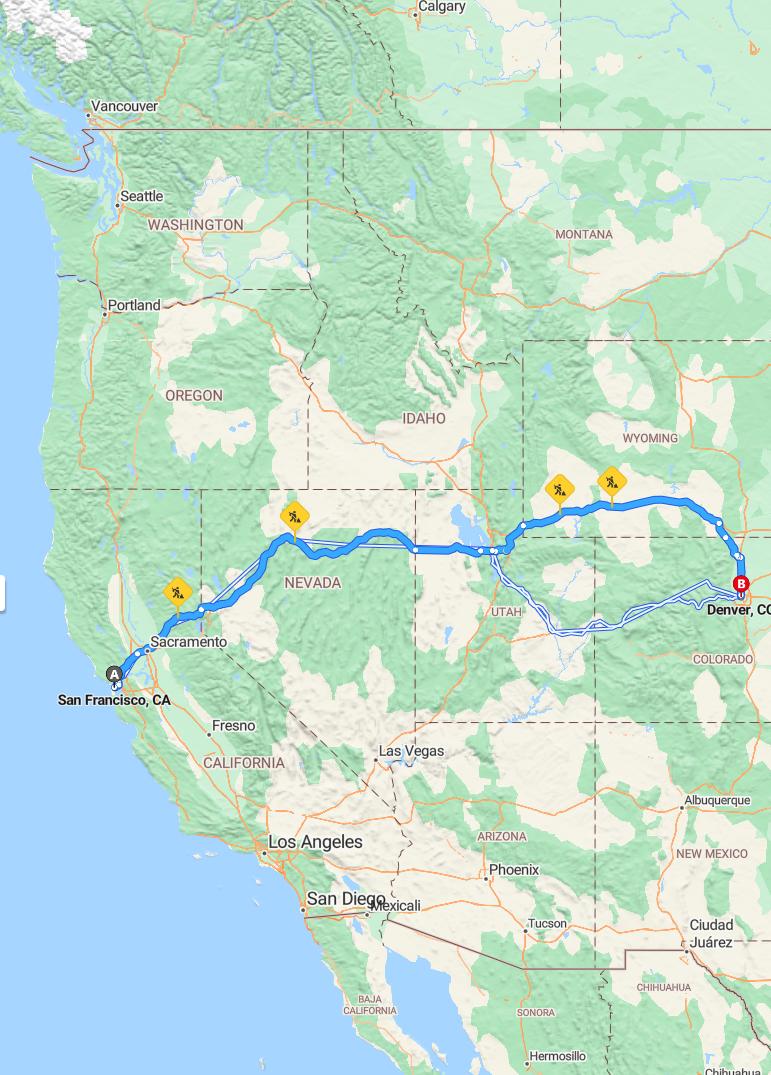Distance and estimated driving time
Traveling from San Francisco to Denver spans approximately 1,248 miles and typically takes around 18 hours and 17 minutes via Interstate 80 East. This route offers a scenic and efficient journey across the western United States, passing through diverse landscapes and key cities. Planning ahead for rest breaks and fuel stops can help ensure a comfortable trip. Preparing your vehicle and checking road conditions beforehand will contribute to a safe and smooth drive.
Driving route
Embarking on a scenic road trip from San Francisco to Denver, travelers will pass through major cities such as Sacramento, Reno, Salt Lake City, and finally arrive in Denver. The journey offers a diverse mix of desert landscapes, mountain vistas, and vibrant city life. Sacramento provides a glimpse into California's rich history, while Reno offers entertainment and casino attractions. As you traverse through Salt Lake City, you'll experience the stunning beauty of the Great Salt Lake and surrounding mountains. Arriving in Denver, travelers can enjoy the city's lively arts scene, outdoor activities, and access to the Rocky Mountains.

Key attractions along the route
Traveling from San Francisco to Denver, travelers can explore a variety of captivating attractions along the route. In Sacramento, the California State Capitol and Old Sacramento Historic District offer rich history and vibrant culture. As you pass through Reno, the lively downtown area and nearby outdoor recreation spots provide entertainment and adventure. Continuing to Salt Lake City, visitors can enjoy the stunning Mormon Temple and nearby natural wonders like the Great Salt Lake, before reaching the vibrant city of Denver, known for its outdoor activities, museums, and scenic mountain views.
Best rest stops and accommodations
On the journey from San Francisco to Denver, travelers can find excellent rest stops and accommodations along key cities. In Sacramento, several well-rated hotels like The Kimpton Sawyer Hotel offer comfortable overnight stays, while nearby rest areas provide convenient short stops. In Reno, the Grand Sierra Resort offers both lodging and entertainment, complemented by reliable rest areas for quick breaks. As you approach Salt Lake City, the city boasts numerous full-service hotels such as the Little America Hotel, alongside well-maintained rest areas for stretching your legs. Finally, in Denver, a variety of accommodations from luxury to budget-friendly options await, and state-of-the-art rest stops along the highway ensure a safe and refreshing break during the drive.
Traffic conditions and possible delays
Traveling from San Francisco to Denver, drivers should be aware of potential traffic delays along key routes such as Sacramento, Reno, Salt Lake City, and Denver. During peak hours, congestion is common in major urban areas, which may extend travel times. Weather conditions, especially in higher elevations like Reno and Salt Lake City, can also cause slowdowns or delays. It is advisable to check current traffic updates before departure to ensure a smooth journey and account for possible rescheduling.
Weather forecast during the drive
The weather forecast for the drive from San Francisco to Denver indicates generally mild conditions, but travelers should be prepared for diverse climates along the route. In Sacramento and Reno, expect clear skies and warm temperatures, ideal for driving. As you approach Salt Lake City, there may be some intermittent clouds and cooler temperatures, especially at higher elevations. Once in Denver, the forecast suggests a mix of sunshine and clouds with the possibility of late-afternoon thunderstorms, so it's wise to stay updated on local weather alerts throughout the journey.
Vehicle maintenance tips for long trips
Before embarking on a long road trip from San Francisco to Denver, it's essential to perform thorough vehicle maintenance. Check fluid levels, including oil, coolant, and brake fluid, to ensure optimal engine performance. Inspect tire pressure and tread wear, and consider rotating tires if needed to prevent blowouts or uneven wear. Additionally, verify that all lights, brakes, and the battery are functioning properly to ensure safety and minimize unexpected breakdowns during the journey through Sacramento, Reno, and Salt Lake City.
Safety precautions and driving tips
When driving from San Francisco to Denver, it is essential to prioritize safety by ensuring your vehicle is well-maintained and equipped with necessary supplies such as a first aid kit, water, and snacks. Plan your route carefully, taking into account weather conditions and potential road closures, especially through mountain passes like Salt Lake City and Reno. Make sure to take regular breaks to prevent fatigue, and stay alert to changing traffic patterns and signage. Additionally, keep your phone charged and have an emergency kit handy to handle any unexpected situations on the journey.
Food and dining options en route
Traveling from San Francisco to Denver offers a variety of food and dining options along the way. In Sacramento, travelers can enjoy diverse restaurants ranging from casual cafes to gourmet eateries, featuring local and international cuisines. In Reno, there are numerous casinos with top-tier buffets and fine dining establishments, perfect for a flavorful break. As you reach Salt Lake City, a vibrant culinary scene awaits with options such as farm-to-table restaurants and popular fast-food chains, providing delightful meals before continuing your journey to Denver.
Alternative routes and detours
While traveling from San Francisco to Denver, travelers can consider alternative routes and detours to explore additional attractions or avoid traffic. An alternative path might include detours through Portland and Boise, offering scenic views and interesting city stops along the way. For those seeking a more direct route, taking Interstate 80 through Nevada and Wyoming can be efficient, but detours to national parks like Yellowstone or the Great Salt Lake may enhance the journey. Planning ahead for potential road closures or construction can help ensure a smooth trip, allowing for spontaneous detours to enjoy regional highlights.
